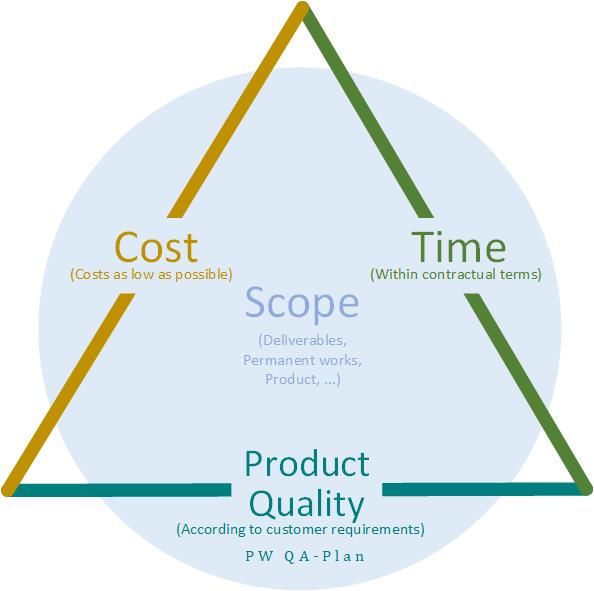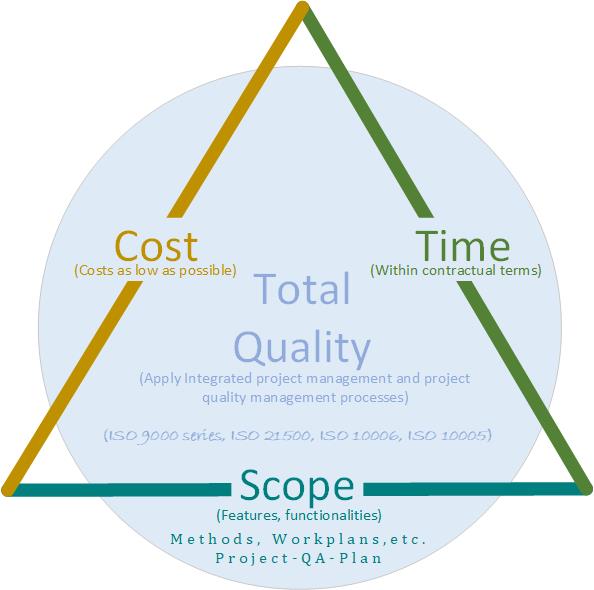Introduction to TQM
project management restraints triangles
SCope triangle

Total quality triangle

introduction
(ISO 9000 series)
TQM is embedded in the current ISO 9000;2015 series of standards.
(EPCI-Projects)
TQM for EPCI projects is primarily about delivering the quality in accordance with all requirements in the contract, avoiding unnecessary costs and promoting opportunities to improve quality to succeed in meeting customer expectations at the lowest cost.
The elements of a PQMS elaborated by “Dickx QHSE-Mangement BV” and presented on this website can be considered as an advanced implementation of the principles of TQM and the current ISO 9000 series of standards.
project quality management system (PQMS)
(ISO 9000 series)
The PQMS related standard of the ISO 9000 series are ISO 10005, ISO 10006 and ISO 21500.
Project quality management involves two organizations, both the original organization and the project organization.
(EPCI-Projects)
In order to tackle the major challenges mentioned in the Homepage, a good elaboration of the PMS/PQMS processes is of great importance.
It is paramount that processes running through the different project phases, project disciplines and external stakeholder are defined as an integrated process and that responsibilities within and between the entities in a project organisation are clearly defined (e.g. “documented information process” and “final documented information”)
Key elements of TQM
Costumer Focus ***
(ISO 9000 series)
As an organisation depends on its customers, it should understand the current and future needs of its customers, meet their requirements and aim to exceed their expectations.
Even apply opportunities to exeed Costumer expectations with limited or no extra cost can be a big win for a company in the future.
(EPCI-Projects)
EPCI Tender Phase:
Elaborate an agreement that satisfy both parties, the Employer and the Contractor.
EPCI Project Phase:
Understanding, implementing and monitoring the implementation of the contractual requirements is a mission primarily for the Project Manager and his discipline managers (DMs: Contractual, Financial, Design, Construction, Installation, Commissioning, Planning, HSE, QA, etc.).
Leadership ****
(ISO 9000 series)
Leaders at all levels establish unity of purpose and direction and create conditions in which people are engaged in achieving the organization’s quality objectives. (ISO 9000:2015)
Some potential key benefits:
- Increased effectiveness and efficiency in meeting the organization’s quallity objectives.
- Better coordination of the organziation’s processes.
- Improved communication between levels and functions of the organization.
- Development and improvement of the capbility of the organization and its people to deliver desired results.
(EPCI-Projects)
A PQMS Framework for EPCI-projects can provide valuable support to achieve top management quality objectives.
The framework must promote the quality required by the contract, at the lowest cost and even promote exceeding customer expectations.
Sub-optimization of one aspect or discipline should be avoided so as not to jeopardize the common goal. That is why integral processes are essential and must necessarily be monitored by the project manager.
Engagement of people ***
(ISO 9000 series)
Competent, empowered and engagement of people at all levels throughout the organization are essential to enhance the organization’s caability to create and deliver value.
In order to manage an organization effectively and efficiently, it is important to respect and involveall people at all levels. Recognition, empowerment and enhancement of competence facilitate the engagement of people in achieving the organization’s quality objectives.
(EPCI-Projects)
On EPCI-projects an induction and training program is essential to provide new team member with the necessary information on the application of the PMS/QMS processes and get them fully involved in short time.
On EPCI-projects a permanent induction and training program is essential to keep team members and other interested parties informed on the application of the PMS/QMS processes.
“Client/Supplier” relationship between EPCI-project disciplines, between departments in the original organization and between team members have a positive impact on the Quality.
Process approach ****
(ISO 9000 series)
Process thinking is fundamental to TQM and the ISO 9000 series of standards.
Consistent and predictable results are achieved more effectively and efficiently when activities are understood and managed as interrelated processes that function as a coherent system.
The QMS consists of interrelated processes. Understanding how results are produced by this system enables an organization to optimize the system and its performance.
Understanding and managing interrelated processes as a system contributes to the organization’s effectiveness and efficiency in achieving its intended results. This approach enables the organization to control the interrelationships and interdependencies among the processes of the system, so that the overall performance of the organization can be enhanced. (ISO 9001;2015)
(EPCI-Projects)
The definition of the processes related to the EPCI-project should be the responsibility of the discipline related department in the originating organisation. (Programming, contract management, financial, fabrication, installation, design, QA, HSE etc)
The EPCI-project related processes and interconnections defined in an PMS/QMS framework for EPCI-projects that is reviewed and approved by the top management of the originating organization.
Suppliers shall be integrated in the Contractor’s PMS/PQMS.
e.g. The “Final Documented Information” process (As-Built) must be thoroughly integrated throughout all project phases and PMS/PQMS processes. In offshore wind fundations projects nowadays of 1 billion Euro, nearly 30 thousand documents has to be delivered properly compiled to the Costumer in way that allows data can be easily retreaved when needed.
Continual Improvement ****
(ISO 9000 series)
One goal of the originating organisation should be the continuous improvement of all services through learning and innovation.
Create a work environment that encourages employees to continuously strive to improve the results of their work. Be aware that much more than 9 out of 10 employees wants to do a good job.
(EPCI-Projects)
“Management of Change” processes are essential to deal with unplanned events that requires a change to align with the contractual requirements or agreed planned activities in an EPCI-project.
A EPCI-PMS/QMS-framework shall be subject to a periodical Management review.
evidence-Based Decision Making ****
(ISO 9000 series)
In order to know if an organization is meeting its objectives, there must be data on performance, and those metrics must be collected and analyzed with accuracy and without prejudice.
(EPCI-Projects)
“This means both, an accurate definition of the database data and attributes and a strict discipline of all stakeholder in creating and maintainting the database.”
Communications ****
(ISO 9000 series)
It’s impossible to maintain a successful TQM approach without an effective communication plan.
Communication plans make sure that all shareholder are aware of what they and others are responsible for, so they can coordinate operations to achieve their common goal.
(EPCI-Projects)
Communication with the employer should be develloped first to apply with the requirements of the Costumer and second to assure the synchronization between the EPCI-project processes with the communication to the Costumer.
Internal communication should be inbedded in the internal processes by the project discipline manager responsible for a particular process.
A permanent induction and training program is essential to keep team members and other interested parties informed on the application of the PMS/QMS processes.
relationship Management ****
(ISO 9000 series)
For sustained success, organizations manage their relationships with relevant interested parties, such as providers.
Relevant interested parties influence the performance of an organization. Sustained success is more likely to be achieved when the organization manages relationships with all of its interested parties to optimize their impact on its performance. Relationship management with its provider and partner networks is of particular importance.
(EPCI-Projects)
“Client/Supplier” relationship between EPCI-project disciplines, between departments in the original organization and between team members have a positive impact on the Quality.
Key suppliers should be integrated into the EPCI contractor’s PMS/PQMS in order to achieve the quality objectives.